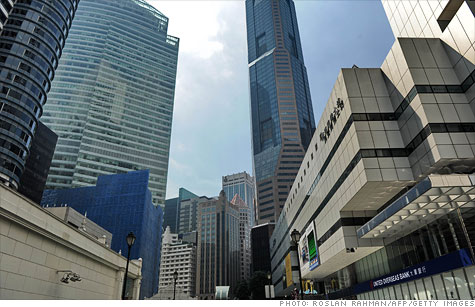Search News

Singapore's more investor friendly rules may allow it and other Asian cities to keep attracting capital from developed markets in the West.
(StockTwits) -- AlphaVN.com is an investing blog focusing on Vietnam and other markets in Southeast Asia. It is written by Peter Pham, a capital market specialist and entrepreneur with expertise in institutional sales and trading.
It's no secret for anyone who follows markets closely that Southeast Asia, and in particular China, will be the engine of growth for the 21st century. This observation is based on a very simple idea.
Capital flows to where it is treated the best.
If traders would stop and look beyond the U.S. and Europe, they would see what legendary investor (and current Singapore resident) Jim Rogers sees: money is fleeing the West and heading East.
Recently, I came across a statistic that confirmed my personal observations from living in Ho Chi Minh City and traveling around Southeast Asia. According to the Financial Times' fDiIntelligence division, Singapore (EWS) not only receives more financial foreign investment than any other major financial center in the world, it receives more than New York, London, Frankfurt and Switzerland....combined.
This is because Singapore is actively courting new capital in response to the abuse that is being dished out to investors in the West.
For example, Singapore's central bank, The Monetary Authority of Singapore, is moving to take advantage of the massive flows of gold and silver. It plans to treat them as currencies -- and not commodities -- by removing the 7% goods and services tax that was collected on all precious metals transactions.
After October 1, bullion quality gold and silver will be freely exchanged without taxation on Singapore's exchanges which will only further increase the demand for them. Volumes on the COMEX have fallen dramatically since gold peaked in September at $1,926 per ounce. Discontent among traders is palpable as a growing number of them feel the market is not trading openly.
The increased transparency and volume of bullion trading along an open exchange is just one example of treating investors like royalty. Another is the MAS' plan to create a clearing house system for over-the-counter derivatives, like credit default swaps.
The trend of investors leaving the dysfunctional New York and London markets to ones where they are treated fairly will accelerate once this change goes into effect. On an open exchange, people legitimately interested in hedging their bond default risk will welcome this evolution like a man coming in from the desert.
Credit default swaps used in this manner are a legitimate market function, especially if they are tied to an underlying asset, i.e. the bond it is insuring. But, naked contracts, trading privately and valued arbitrarily, are a cancer eating away at the heart of Wall Street.
Understanding the evolution of the Southeast Asian markets like Singapore, Hong Kong and Shanghai is an important edge investors need to be aware of. Capital gains can only come from places where capital is being deployed, and not destroyed. ![]()
| Index | Last | Change | % Change |
|---|---|---|---|
| Dow | 32,627.97 | -234.33 | -0.71% |
| Nasdaq | 13,215.24 | 99.07 | 0.76% |
| S&P 500 | 3,913.10 | -2.36 | -0.06% |
| Treasuries | 1.73 | 0.00 | 0.12% |
| Company | Price | Change | % Change |
|---|---|---|---|
| Ford Motor Co | 8.29 | 0.05 | 0.61% |
| Advanced Micro Devic... | 54.59 | 0.70 | 1.30% |
| Cisco Systems Inc | 47.49 | -2.44 | -4.89% |
| General Electric Co | 13.00 | -0.16 | -1.22% |
| Kraft Heinz Co | 27.84 | -2.20 | -7.32% |
| Overnight Avg Rate | Latest | Change | Last Week |
|---|---|---|---|
| 30 yr fixed | 3.80% | 3.88% | |
| 15 yr fixed | 3.20% | 3.23% | |
| 5/1 ARM | 3.84% | 3.88% | |
| 30 yr refi | 3.82% | 3.93% | |
| 15 yr refi | 3.20% | 3.23% |
Today's featured rates: